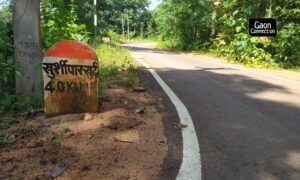Coimbatore, Tamil Nadu.
Every day, Sivagami and her 60-year-old mother Bharatha Matha make their way from their village Vasanthanagar to their place of work at Ottupattarai, barely five minutes away. They work at the “Ottupattarai Waste Management Park” that was, till a couple of years ago, a foul, fly-infested, festering municipality city dump situated less than four kilometers away from Coonoor town, a hill station in the Nilgiris, Tamil Nadu, about 550 km from its capital Chennai.
Today, the Ottupattarai dumpyard that is spread over 3.237 hectares can easily pass off as a tourist destination. It occupies a vantage point and overlooks Coonoor town, a part of the Coonoor Pass, the historic fort of Hulical Droog that in the 18th Century was used by Tipu Sultan, and Ketti valley and the Kundah ranges in the distance.
A lot of tender, loving care has gone into cultivating flower beds and lawns over a hectare of the land with splashes of colour where dahlias, petunias, a few pansies, daisies, honeysuckle, delphiniums and zinnias bloom. Nearly 40 bottle brush and erythrina saplings are slowly growing into trees.
Starting clean
All this began less than a year ago in November 2019, when the waste management project was launched. The challenge of transforming the landfill into the impeccably well-kept facility, was taken up by a citizen’s initiative called Clean Coonoor, that registered itself as a non-profit last year and signed a Memorandum of Understanding with the Coonoor Municipality in January 2020, to deal with the nearly 97 tonnes of dry waste generated in town.
A few months prior to that, on World Environment Day, June 2019, Clean Coonoor along with the Coonoor Municipality, had undertaken the cleaning of a stretch of the Coonoor river and removed nearly 12,000 tonnes of sludge and garbage from it. The sludge was deposited at Ottupattarai and the Municipality requested if the non-profit would clean up the area and landscape it. Thereafter, Clean Coonoor offered to handle the dry waste that came there and look after the facility.
As work began, villagers from and near Ottupattarai began trickling in looking for a job at the facility. In January this year, there were six people in the facility. Now it employs 20 people. These include 14 sorters like Sivagami and Ilakiya, who are paid Rs 9,000 each every month. There is an incinerator operator, one baler operator, a night watchman Pughal, who is a loader and a part time guard. Together, they deal with the nearly-100 tonnes of waste that ends up at the facility. The sorters segregate the dry waste that is brought there by the municipality lorries.
“Before November, the municipality dumped the dry waste at Ottupattarai, that is all. Only when Clean Coonoor came into the picture did the segregation and the real clean-up happen,” Commissioner, Coonoor Municipality, K Balu, told Gaon Connection. “It has speeded up the process of streamlining the waste collection to an extent, and we hope the people of Coonoor will appreciate the hard work and be more proactive in segregating their waste before handing it over to our sanitary workers. It will only clean up their town better and quicker,” he added.
The municipality tries to ensure segregation at source. Coonoor generates about 13 tonnes of waste per day. Of that, on an average, three tonnes of dry waste per day comes to Ottupattarai and about six tonnes go to Reilley Compound, about three and a half kms away where it is composted. The remaining wet waste is handled and dealt with in local parks.
Clean Coonoor has a core team of 20 members with many volunteers who come and go. One of its trustees Vasanthan Panchavarnam, along with another volunteer Navin Joseph, oversees the waste management park while the others are working with sprucing up Coonoor town.
“There is a remarkable change in the way the inhabitants are treating their garbage. Most of them are segregating at source, and that positive attitude has helped us take the project forward more efficiently,” founder member and managing trustee of Clean Coonoor Samantha Iyanna told Gaon Connection. It is the same spirit of wanting to give back to the town that is inspiring other cleaning projects, she added. “The younger generation that had returned home in the past few months is now involved in cleaning up bus shelters and painting graffiti on the walls,” she said.
Gandipet Welfare Society, a non-profit that does similar work in villages in Telangana to make them plastic-free, has funded the river cleaning and the Ottupattarai project. “Many of us who own homes in the Nilgiris have contributed nothing to it, and I have been coming here for more than 35 years, and when I heard of Clean Coonoor, and its plans to clean up the hill station, I thought it was a project worth supporting,” Rajshree Pinnamaneni, member of the Hyderabad-based non-profit, told Gaon Connection. The non profit has contributed nearly Rs 50 lakh and continues to pay about Rs two lakh per month for the running of the facility.
“Gandipet Welfare Society has promised to keep us going till we build up a corpus fund with help from Corporates,” said Iyanna.
Trash talk
The trucks from the municipality bring in the dry waste that is unloaded into troughs at the facility and there, it is sorted and segregated. The waste plastic and paper are baled into bundles to be transported to Hyderabad, Pollachi and Erode, respectively. “In August, we received nearly 97 tonnes of dry waste of which we recovered more than 14 tonnes of plastic and nearly 10 tonnes of paper and cardboard,” Panchavarnam explained to Gaon Connection.
The rest of the non-biodegradable dry waste is made up of e-waste and metal, bottles, broken glass, clothes, sanitary towels, diapers, hair, footwear.
In the first two weeks of September alone, dry waste, weighing 41.868 tonnes has been deposited at the facility. Plastic waste accounts for 5.6 tonnes of it. The recovered plastic, almost all of it, is compressed into bales weighing 250 kgs each and transported to Hyderabad about 850 kilometres away where a solid waste management organisation called Pyrogreen Energy Pvt Ltd. extracts fuel from it that can be used as furnace oil. The company pays to transport the plastic.
Segregating, sorting, recycling and upcycling has a huge positive impact on the environment. “Consider this. By recycling the amount of plastic we have done in the past eleven months, it is tantamount to saving 120 barrels of crude oil and 630 megawatts of electricity.”
Recovering and recycling the paper waste also has a huge impact, said Panchavarnam. “The facility has had a hand in saving 1,682 trees and 2.5 million litres of water, besides preventing 95 tonnes of carbon equivalent in greenhouse gas emissions,” he explained.
Companies in Pollachi and Erode take away the paper and cardboard to turn them into paper boards.
Employment opportunities
This unique waste management project, besides handling the growing waste problem in Coonoor, is also providing livelihoods to many local villagers.
Sivagami, 38, and her family have lived next door for nearly 20 years, and she said she can hardly believe the changes in the neighbourhood. “I could never keep the doors of my home open because of the fly menace, and the stench was unbearable,” she told Gaon Connection. Not anymore. Sivagami now brings friends and family to show off her place of work. For now, she stays at a rented room paying Rs 1,000 a month. “Who knows, if I save enough, I might consider settling down here,” she smiled.
Take the case of Ilakiya who comes from Bandishola, about seven km, away to work at the Ottupattarai Waste Management Park. She has to come by bus, but thinks nothing of it. “I worked at the tea gardens as casual labour, or as a construction site worker earning about Rs 250 a day,” she told Gaon Connection. But the pay was intermittent and days would go by when she had no work and, therefore, would earn nothing. Less than a year ago, when Ilakiya was desperately on the lookout for an assured source of income, someone told her there was work to be had at the facility, if she did not mind working with garbage.
“It meant a regular income of Rs 9, 000 a month, and I grabbed the opportunity,” said 33-year-old Ilakiya, whose husband Pughal also works here as a loader. Before this, 35-year-old Pughal did odd jobs. Again, it meant income was sporadic. “Both of us earning a steady income is good for our girls,” said Ilakiya. Her daughters study in the eighth and the first standard, respectively.
Waste to wealth
Clean Coonoor is considering setting up a plant to extract fuel from waste plastic. The district administration has sanctioned land and the non-profit has found someone who has agreed to fund 20 per cent of the cost (the total estimate is two crore rupees). We are hoping we will get the rest of the 80 per cent from CSR funds,” said Panchavarnam. If the plant comes up, Clean Coonoor believes it can handle the plastic waste of the entire Nilgiris district, not just of Coonoor. “Imagine how much of the waste we can prevent ending up at landfills and water bodies,” exclaimed Panchavarnam. Setting up of the plant would also mean more employment to local inhabitants, who are having an especially hard time of it, with this year’s tourist season being completely washed out.
Another outcome of the spruced-up Ottupattarai garbage dump is that real estate in the area has gone up. A real estate promoter attributes this almost entirely to the cleaning up of the area. According to him, five years ago, the plots that were selling for approximately Rs 1.5 lakh a cent are today valued at anything up to Rs 5 lakh a cent.
“Clean Coonoor is bringing dignity into what is considered ‘dirty work’. I hope the hard work the non-profit is putting in and the novel waste management park it has developed will make people pause before they discard garbage outside their homes,” the collector of the Nilgiris Divya Innocent told Gaon Connection.



















